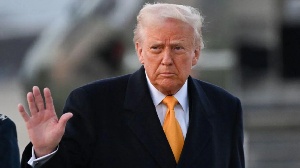- Home - Entertainment
- Lifestyle News
- Year In Review
- Music News
- Entertainers
- Entertainment Archive
- Entertainment Photos
- Jokes
- Entertainment Headlines
- Ameyaw Debrah
- Brown GH
- Celebrities Buzz
- GH Base
- Ghana Celebrities
- Gh Gossip
- GH Page
- GH Splash
- Hot Gossip GH
- YEN
Movies of Monday, 12 May 2025
Source: www.ghanawebbers.com
Trump's 100% Tariff on Foreign Movies threatens to cripple African Cinema
President Donald Trump recently threatened to impose a 100% tariff on foreign films. This has caused panic in the international filmmaking community, especially in Africa. The African cinema sector is particularly anxious about this potential move. Trump claims it will revive a "dying" Hollywood. However, this tariff could significantly impact producers and consumers in Nigeria and Ghana.
Trump's Suggested Tariff: A Shot Across the Bow?
On Truth Social, Trump announced plans for a 100% tariff on foreign films. He argues that foreign incentives are harming the American movie industry. If implemented, this could escalate trade tensions and provoke retaliation from other countries. It may also change international film distribution drastically. Many in the US film industry disagree with Trump's view of the industry's challenges.
Is Hollywood Really "Dying"?
Trump's claim that Hollywood is "dying" lacks evidence. While Hollywood faces competition from streaming services, it remains a global leader. Other countries offer tax credits to attract filmmakers, which is common practice worldwide. California also provides tax incentives to keep productions local. The idea that Hollywood is dying is not widely accepted.
How Would the Tariffs Work?
The specifics of implementing these tariffs are unclear. Movies as intellectual property do not fit traditional tariff models well. The U.S. Trade Representative suggests tariffs might involve increased import duties or licensing fees instead. This uncertainty raises questions about legal challenges under international trade laws like those of the WTO. Such tariffs could face significant legal hurdles.
African Incentives and the New Global Film Landscape
African nations recognize their filmmaking industries' economic and cultural value. Countries like South Africa and Nigeria offer tax breaks and co-production agreements to attract filmmakers. These incentives aim to build local capabilities and create jobs while promoting cultural exchange. If U.S. tariffs are enacted, they could hinder international cooperation and slow African cinema's growth.
These proposed tariffs might disrupt global trade agreements and destabilize economies worldwide. Institutions like the African Union support policies that promote film on the continent as part of broader economic strategies.
Influence on African Cinema
Trump's proposed tariffs would directly affect African cinema industries like Nollywood and Ghallywood. While these tariffs may not be their main revenue source, they could limit foreign distribution opportunities significantly at festivals or theaters abroad. Reduced U.S demand for overseas films might harm African cinema’s global presence.
Additionally, these tariffs could deter international streaming platforms from investing in African content, limiting audience reach further still. This situation risks segmenting the world film market more than ever before, forcing African producers to rely heavily on local distribution channels.
However, this challenge might encourage intra-African collaborations and investments in local infrastructure instead.
Opportunities and Challenges
Despite potential drawbacks from these tariffs, there are opportunities for African filmmakers too. They can diversify markets by focusing more on digital distribution and regional cooperation against negative impacts from external forces.
The proposed tariffs highlight how interconnected global cinema is today; they remind filmmakers of their need to adapt quickly to changing circumstances in entertainment markets worldwide.
As events unfold, Africa must carefully consider its future while preparing to protect its emerging film industries so that its stories continue reaching international audiences effectively.











